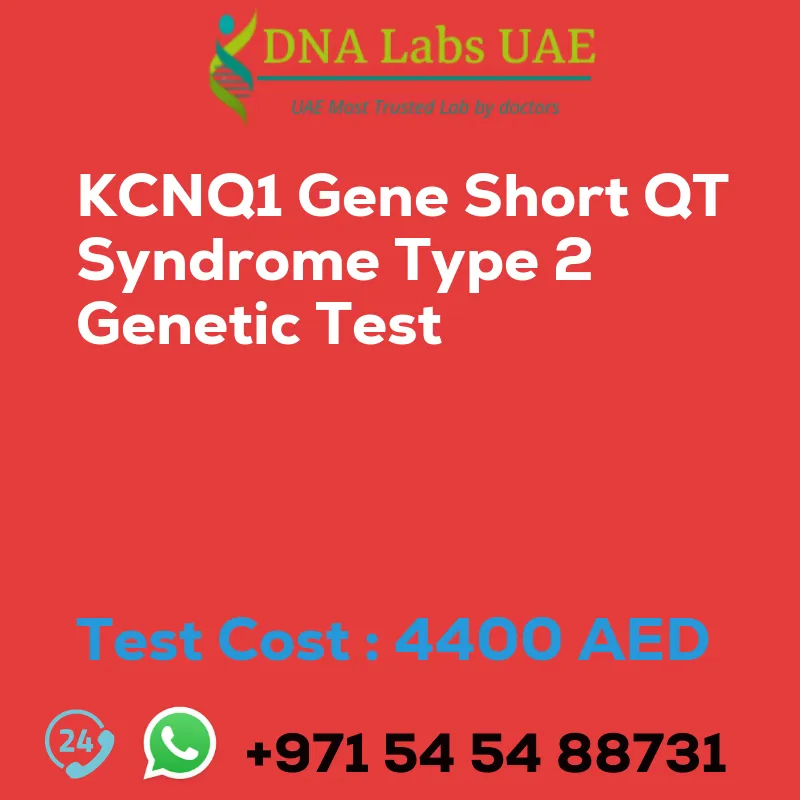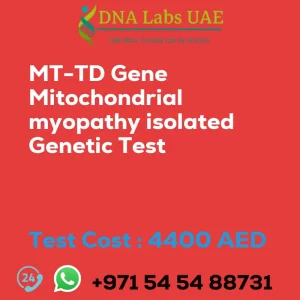KCNQ1 Gene Short QT syndrome type 2 Genetic Test
Welcome to DNA Labs UAE, where we offer the KCNQ1 Gene Short QT syndrome type 2 Genetic Test. This test helps in diagnosing and understanding the risk of Short QT syndrome type 2, a condition characterized by a shortened QT interval on an electrocardiogram (ECG) and an increased risk of life-threatening arrhythmias.
Test Components
- Price: 4400.0 AED
- Sample Condition: Blood or Extracted DNA or One drop Blood on FTA Card
- Report Delivery: 3 to 4 Weeks
- Method: NGS Technology
- Test Type: Cardiovascular Pneumology Disorders
- Doctor: Cardiologist
- Test Department: Genetics
Pre Test Information
Prior to undergoing the KCNQ1 Gene Short QT syndrome type 2 NGS Genetic DNA Test, it is important to provide the clinical history of the patient. Additionally, a genetic counseling session will be conducted to draw a pedigree chart of family members affected by KCNQ1 Gene Short QT syndrome type 2.
Test Details
The KCNQ1 gene is responsible for encoding a protein that helps regulate the electrical activity of the heart. Mutations in this gene can lead to Short QT syndrome type 2. To analyze the KCNQ1 gene for potential mutations or variants associated with the condition, we utilize NGS (Next-Generation Sequencing) technology. NGS allows for the simultaneous sequencing of multiple genes or even the entire genome.
The KCNQ1 gene mutations in Short QT syndrome type 2 NGS Genetic DNA Test involve obtaining a DNA sample, typically through a blood sample or cheek swab. The DNA is then sequenced using NGS technology. The resulting sequence data is analyzed to identify any mutations or variants in the KCNQ1 gene that may contribute to the individual’s risk of developing Short QT syndrome type 2.
This genetic test can help confirm a diagnosis of Short QT syndrome type 2 in individuals with clinical symptoms or a family history of the condition. It also aids in genetic counseling and treatment decisions, such as the use of medications or implantable devices to manage the risk of arrhythmias.
| Test Name | KCNQ1 Gene Short QT syndrome type 2 Genetic Test |
|---|---|
| Components | |
| Price | 4400.0 AED |
| Sample Condition | Blood or Extracted DNA or One drop Blood on FTA Card |
| Report Delivery | 3 to 4 Weeks |
| Method | NGS Technology |
| Test type | Cardiovascular Pneumology Disorders |
| Doctor | Cardiologist |
| Test Department: | Genetics |
| Pre Test Information | Clinical History of Patient who is going for KCNQ1 Gene Short QT syndrome type 2 NGS Genetic DNA Test. A Genetic Counselling session to draw a pedigree chart of family members affected with KCNQ1 Gene Short QT syndrome type 2 NGS Genetic DNA Test gene KCNQ1 |
| Test Details |
The KCNQ1 gene is responsible for encoding a protein that helps regulate the electrical activity of the heart. Mutations in this gene can lead to a condition called Short QT syndrome type 2, which is characterized by a shortened QT interval on an electrocardiogram (ECG) and an increased risk of life-threatening arrhythmias. NGS (Next-Generation Sequencing) is a high-throughput sequencing technology that allows for the simultaneous sequencing of multiple genes or even the entire genome. In the context of genetic testing for Short QT syndrome type 2, NGS can be used to analyze the KCNQ1 gene for any potential mutations or variants that may be associated with the condition. The NGS genetic test for KCNQ1 gene mutations in Short QT syndrome type 2 involves obtaining a DNA sample, usually through a blood sample or cheek swab, and then sequencing the DNA using NGS technology. The resulting sequence data is then analyzed to identify any mutations or variants in the KCNQ1 gene that may be contributing to the individual’s risk of developing Short QT syndrome type 2. This genetic test can help confirm a diagnosis of Short QT syndrome type 2 in individuals with clinical symptoms or a family history of the condition. It can also be used for genetic counseling and to inform treatment decisions, such as the use of medications or implantable devices to manage the risk of arrhythmias. |








